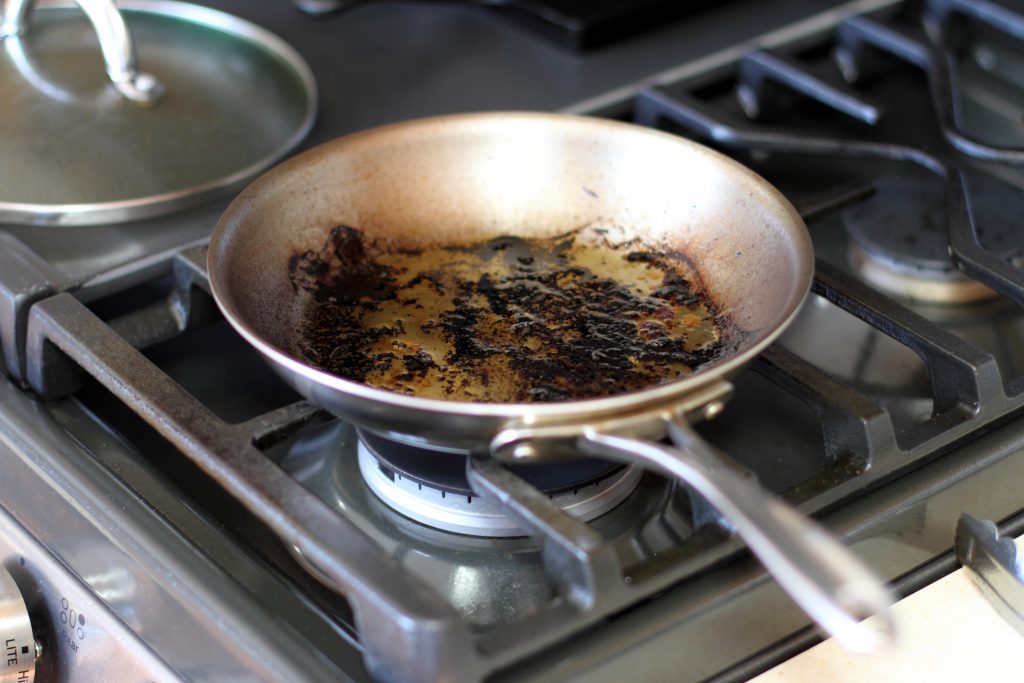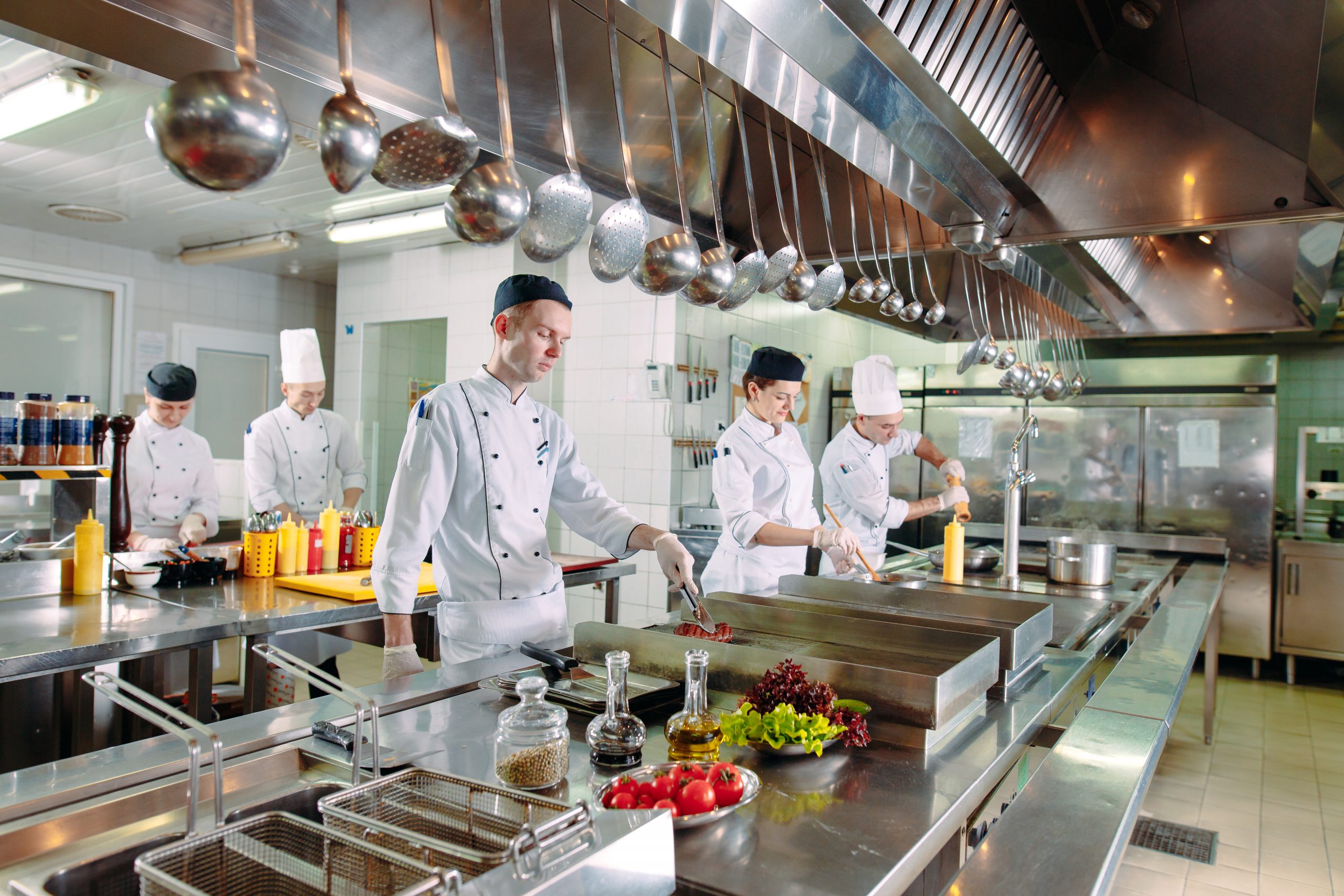Food handling facilities such as restaurants, institutional cafeterias, grocery stores, bakeries, and delis can contribute to stormwater pollution, mainly through improper cleanup practices that allow food particles, oil, grease, and cleaning products to flow to a street, gutter, or storm drain. Water that runs off sidewalks, alleys, and street gutters flows into storm drains. Anything entering storm drains flows directly to the Bay or Ocean. Unlike sanitary sewers (sinks, toilets, etc.) which flow to a wastewater treatment plant, storm drains flow directly to local waterways without treatment of any kind!
Best Practices
Follow these best practices to prevent pollution, protect public health, and avoid fines or other enforcement action.
Cleaning & Maintenance: Clean equipment, floor mats, filters, and garbage cans in a mop sink, wash rack, or floor drain connected to the sewer through a grease trap. Don’t wash them or pour wash water in a parking lot, alley, sidewalk, or street. Sweep outside areas and put the debris in the garbage, instead of sweeping or hosing it into the parking lot or street.
Disposing Of Food Waste & Garbage In The Dumpster Or Compactor: Keep dumpster lids closed and the areas around them clean. Do not fill with liquid waste or hose them out. Call your trash hauler to replace any dumpsters that are damaged or leak. Do not wash down or steam clean trash enclosure areas or trash bins unless you collect the water and dispose of it into the sanitary sewer. Hire a mobile pressure wash business that is familiar with the stormwater regulations to clean these areas and make sure they provide you with a record of proper wastewater disposal.

Managing spills: Use dry methods for spill cleanup, sweep, and use cat litter instead of hosing. Have spill containment and cleanup kits available for possible spills on your property. To report serious toxic spills, call your local police department immediately.
Handling toxic chemicals: Dispose of all unwanted toxic materials like cleaners, solvents, and detergents through a hazardous waste hauler—these items are not trash! Use non-toxic cleaning products whenever possible. Contact a licensed hazardous waste hauler for recycling. Click here to learn more about the Very Small Quantity Generator (VSQG) Program.
Recycling Oil & Grease: Oil and grease wastes can be recycled. Don’t pour oil or grease into sinks, floor drains, or onto a parking lot or street. Keep grease bins covered and contained. Below is a list of oil recycling locations in San Mateo County.
| Name | Contact Information | Type |
| Shoreway Environmental Center | 333 Shoreway Rd. San Carlos, CA 94070 (650) 802-8355 website | • Recycle • Drop-off |
| Blue Line Transfer | 500 E. Jaime Ct. South SF, CA 94080 (650) 589-4020 website | • Recycle • Drop-off |
| Daly City Department of Water & Wastewater | 153 Lake Merced Blvd. Daly City, CA 94015 (650) 991-8208 website | • Recycle • Drop-off |
| Recology of the Coast Recycling Yard | 2305 Palmetto Ave. Pacifica, CA 94044 (650) 355-9000 website | • Recycle • Drop-off |
| Republic Services of Daly City | 1680 Edgeworth Ave. Daly City, CA 94015 (650) 756-1130 website | • Pick-up • Recycle |
Very Small Quantity Generator (VSQG) Program
Some businesses generate very little hazardous waste and may be eligible to participate in the Very Small Quantity Generator (VSQG) Program. The Program is designed to provide an inexpensive hazardous waste disposal option to these companies, non-profits, and other entities instead of contracting with a commercial hazardous waste management firm. The Program operates by appointment only. Click here to learn more.
Additional Resources
- CASQA Industrial/Commercial BMP Handbook Fact Sheet BG-30 Food Service Facilities
- Best Management Practices for Food Service Facilities English | Spanish | Chinese
- Clean It Right: English | Spanish
- How Your Business Can Prevent Stormwater Pollution: English | Spanish | Chinese
- Best Management Practices for Parklets: English
Contact Information
- Stormwater Business Inspectors: Municipal Stormwater Inspectors visit commercial and industrial businesses to help them understand and comply with stormwater pollution control requirements.
- Sanitary Sewer Treatment Authorities: All discharges to sanitary sewer must be approved by your local sanitary sewer treatment authority.
- Local Hazardous Waste Regulator: The San Mateo County Environmental Health Division is the Certified Unified Program Agency (CUPA) for all areas of San Mateo County and can be reached at: (650) 372-6200.
